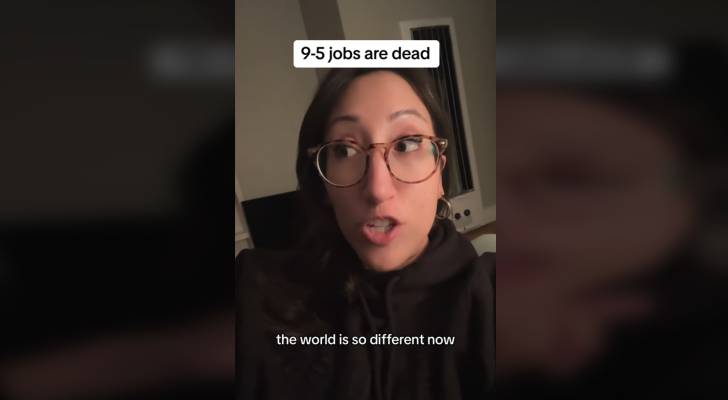
‘I DON’T CARE ANYMORE’: WORKERS PREFER JUGGLING MULTIPLE PART-TIME JOBS RATHER THAN A FULL-TIME ONE — HOW ‘THE GREAT EXHAUSTION’ IS FUELLING A NEW WAY OF WORKING
Working two or three part-time jobs used to be a sign someone was struggling to get by. But now, it may be the sign of one who’s thriving.
Bella, a financial influencer on TikTok who goes by @finance_with_bella, noticed this sea change when scrolling through her LinkedIn feed.
Don't miss
- Commercial real estate has beaten the stock market for 25 years — but only the super rich could buy in. Here's how even ordinary investors can become the landlord of Walmart, Whole Foods or Kroger
- Cost-of-living in America is still out of control — use these 3 'real assets' to protect your wealth today, no matter what the US Fed does or says
- These 5 magic money moves will boost you up America's net worth ladder in 2024 — and you can complete each step within minutes. Here's how
“The job market is so bad that people aren’t even going back to full-time work anymore,” she says in a TikTok video. “They’re actually making more money doing multiple part-time jobs than picking one full-time job, and getting underpaid and overworked.”
Over 2,000 commenters chimed in, most of whom agreed with her.
“A friend of mine with a PhD is cleaning houses,” one commenter writes. “She just puts in her headphones and does chores because it’s more fulfilling than the toxic academic job market.”
But this trend is about more than just spiritual fulfillment — and it may not be a fad either.
The Great Exhaustion
Bella points out that many job hunters are “over” the lengthy process of job hunting.
“It’s the endless interviews, it’s the endless rejection,” she says. “It gets really tiring after a while.”
Workers are certainly staying out of work for longer these days — data from the Bureau of Labor Statistics (BLS) shows Americans remain unemployed for an average of 21.4 weeks (5.35 months), as of April. Bella says that she’s heard of many people who’ve been searching for a job for six months or a year — despite the unemployment rate remaining low at 3.9%.
But the job search isn’t the biggest hurdle of landing a new gig, write many of the commenters on Bella’s video. Many are simply done with work as we know it.
“I’d rather just have 2 part time jobs that don’t require much from me,” one commenter says. Another says they walk dogs, teach yoga and clean Airbnbs, allowing them to create the life they “love.”
Workplace trend writer and computer science professor Cal Newport coined a term for this phenomenon in an article he wrote for The New Yorker last December: the Great Exhaustion. Newport writes that the Great Exhaustion is the overwhelming fatigue that white-collar workers experience, in large part thanks to the constant online communication at work.
Burnout was experienced by 65% of employees, according to a 2023 survey from HR software company, isolved. After the tiring pandemic years brought about the workplace trends of the Great Resignation and quiet quitting, the Great Exhaustion is just another iteration of workers expressing their frustration.
Read more: Thanks to Jeff Bezos, you can now use $100 to cash in on prime real estate — without the headache of being a landlord. Here's how
The antidote to the Great Exhaustion
Earlier this year, burnout expert Emily Ballestros wrote an article for Time about how to get yourself out of the Great Exhaustion. Turns out, it’s exactly what Bella and her followers are doing: opting out.
Ballesteros cites the research of author Dan Buettner, who spent years studying the world’s “blue zones,” the places in the world where people live the longest, healthiest lives. He discovered that every one of these places — which range from Italy to Japan to California — put human needs first. The people who live in blue zones prioritize socializing, exercising and “working with a purpose rather than for the sake of maximizing productivity.”
“We have not built a human-needs-first society,” Ballesteros wrote. “We have built a business-needs-first society, and it is starting to show.”
This may be why 64 million American workers engaged in freelance work in 2023, according to a survey by gig work platform Upwork.
The survey doesn’t explain if these people are freelancing by choice or out of necessity, but it does show that this work is more and more common.
Though freelancing is precarious, Bella’s commenters are choosing to embrace it rather than seek out full-time work.
“The pay isn’t worth the stress,” one commenter writes on Bella’s video. “I don’t care anymore.”
What to read next
- Car insurance premiums in America are through the roof — and only getting worse. But 5 minutes could have you paying as little as $29/month
- ‘Baby boomers bust': Robert Kiyosaki warns that older Americans will get crushed in the 'biggest bubble in history' — 3 shockproof assets for instant insurance now
- ‘You didn’t want to risk it’: 80-year-old woman from South Carolina is looking for the safest place for her family’s $250,000 savings. Here's Dave Ramsey's response
This article provides information only and should not be construed as advice. It is provided without warranty of any kind.
2024-06-24T14:46:09Z dg43tfdfdgfd